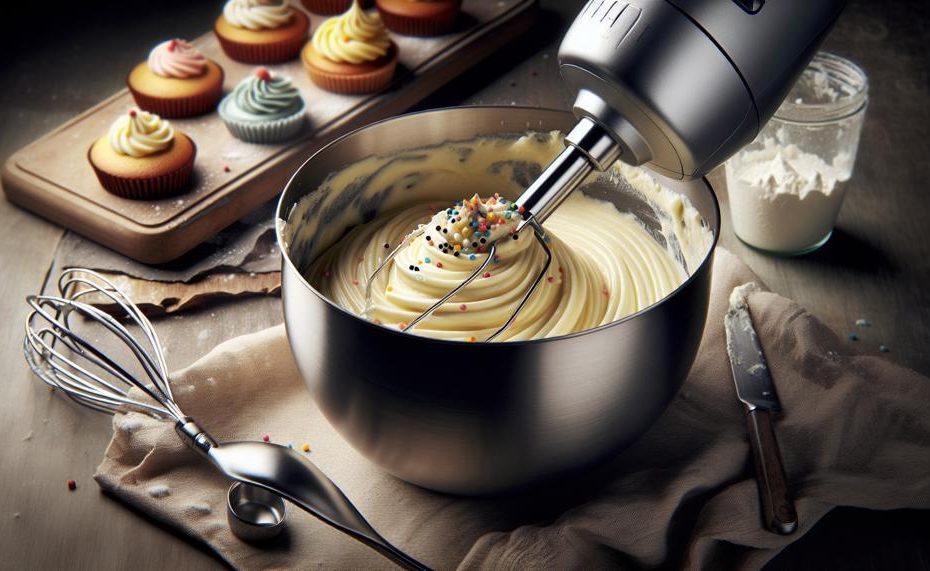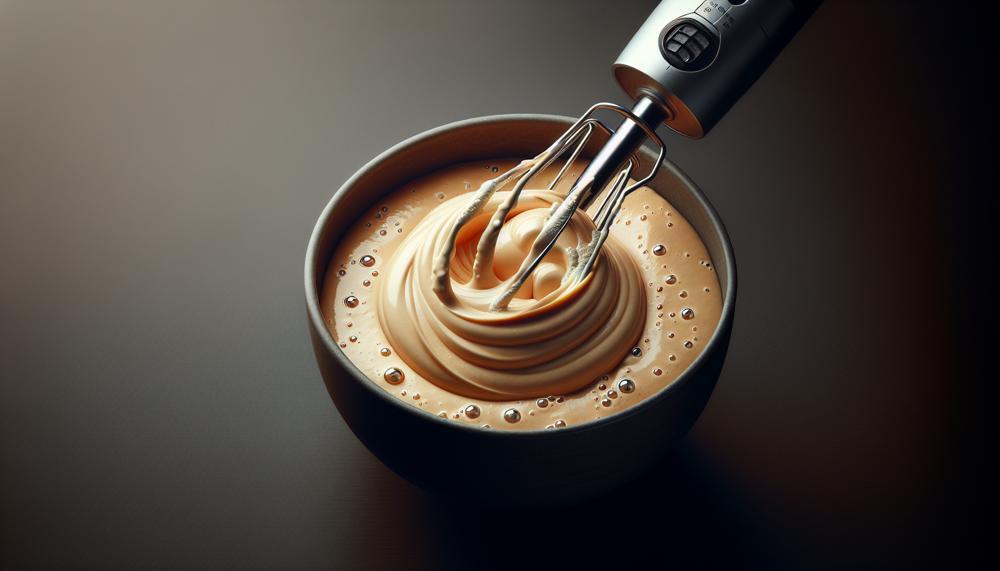Do you find yourself struggling with clumpy, uneven cake batter every time you bake? It’s time to upgrade your baking game and make your life easier with a simple tool that you probably already have in your kitchen – a hand blender.
Also known as an immersion blender, this versatile gadget can transform the way you make cakes. Say goodbye to messy cleanups, sore arms from whisking, and inconsistent batter.
In this blog post, we’ll delve into the world of hand blenders for cake batter and show you why it’s the ultimate game-changer for all your baking needs.
So, can hand blender be used for cake batter?
Yes, a hand blender can be used to mix cake batter. It can quickly incorporate cold butter into flour for cakes, muffins, and other baked goods.
Get ready to say goodbye to lumps and hello to perfectly blended batter. Let’s dive into the details of this game-changing kitchen gadget.
Contents
- 1 What is an immersion blender?
- 2 The benefits of using an immersion blender for cake batter
- 3 Choosing the right immersion blender for cake batter
- 4 Tips for using an immersion blender for cake batter
- 5 Alternatives to using an immersion blender for cake batter
- 6 Other uses for immersion blenders in the kitchen
- 7 Safety precautions when using an immersion blender
- 8 Conclusion
What is an immersion blender?
When it comes to making cake batter, the primary function of an immersion blender and a traditional hand mixer differs significantly. While a hand mixer is specifically designed for baking, an immersion blender is primarily used for blending and pureeing foods.
| Immersion Blender | Hand Mixer |
| Utilized for blending, pureeing, and chopping foods like soups, sauces, and smoothies | Designed for mixing cake batter, cookie dough, and other desserts |
| Features a handheld device with a blade at the bottom to blend ingredients directly in a bowl or container | Consists of a handgrip with a motor and an attachment hub for various attachments like dough hooks or whisk beaters |
| A single-purpose appliance | A multi-purpose appliance with various attachments |
| Can also be used for making whipped cream, mashed potatoes, mayonnaise, and pureeing fruits or vegetables apart from mixing cake batter | Not suitable for blending or pureeing foods but can be used for whipping cream or egg whites |
| Compact and space-saving design | Bulkier and takes up more space in the kitchen |
| Priced from $20 to $150 depending on features and attachments | Priced from $25 to $100 depending on brand and features |
Despite their unique functionalities, both appliances can be used interchangeably for certain tasks such as whipping cream or egg whites. However, while immersion blenders may not be as powerful as hand mixers, they can still produce a fluffy batter if used correctly. It is recommended to use a powerful immersion blender (at least 200 watts) and not overmix the batter to avoid a dense texture.
In terms of convenience and ease of cleaning, immersion blenders may have an advantage as they can be used directly in the mixing bowl or container, eliminating the need for separate mixing bowls and beaters. Additionally, immersion blenders are easier to clean and store due to their compact design.
The benefits of using an immersion blender for cake batter
One of the greatest advantages of utilizing an immersion blender for cake batter is its ability to mix thoroughly, resulting in fewer lumps and a faster mixing process.
To achieve the best results, there are also helpful tips to keep in mind, as well as attachments that can make the mixing process even easier.
Choosing the right immersion blender for cake batter
When deliberating on the appropriate immersion blender for cake batter, there are several aspects to take into account, including its wattage, accessories, and simplicity of maintenance.
It is also crucial to adhere to proper techniques when utilizing an immersion blender in order to maximize its potential.
Tips for using an immersion blender for cake batter
Here are some helpful suggestions for using an immersion blender to effectively mix cake batter:
Choose a powerful immersion blender
Ensure that your immersion blender has at least 200 watts of power. This will guarantee thorough mixing and a lump-free batter.
Begin with dry ingredients
Mix the dry ingredients in a large bowl using the immersion blender before adding any wet ingredients. This step will break up lumps and produce a smoother batter.
Alternate between wet and dry ingredients
As you add in the wet and dry ingredients, alternate between them while using the immersion blender. This will prevent overmixing and result in a well-combined batter.
Add eggs last
To avoid overmixing and creating a tough cake, gently mix in the eggs last using the immersion blender.
Avoid overmixing
Overmixing with an immersion blender can lead to a dense and tough cake. Stop blending once all ingredients are well incorporated.
Utilize attachments
Many immersion blenders come with attachments such as whisking blades or blending pitchers, which can make the mixing process even easier and more efficient.
Keep quantity in mind
Immersion blenders work best for small batches of cake batter. For larger cakes, consider using a hand mixer or stand mixer instead.
Follow safety precautions
Always follow safety precautions when using an immersion blender, such as turning off and unplugging the appliance before removing or changing attachments.
By following these tips, you can effectively use an immersion blender for cake batter and create a smooth, well-mixed batter for your homemade cakes. Remember to choose the appropriate appliance for each task and handle the immersion blender carefully to ensure safe and successful baking experiences.
Alternatives to using an immersion blender for cake batter
When it comes to blending and mixing ingredients, the immersion blender is definitely a go-to kitchen tool. However, there are other options available that can effectively create lump-free and well-mixed cake batter.
Let’s take a look at some alternative tools that can be used instead of an immersion blender:
| Hand mixer | A hand mixer is a great substitute for blending cream and eggs, as it adds air for a fluffier and lighter texture. Not only is it more cost-effective than an immersion blender, but it also offers a unique functionality. |
| Food processor | A food processor is a versatile tool that can be used for making salad dressings and salsas. It has the ability to blend ingredients to your desired texture, and even allows you to add oil from the top while blending. |
| Stand blender | The stand blender is a powerhouse in the kitchen, serving as both a food processor and an immersion blender. With its heavy-duty motor and sharp blades, it can easily mix cake batter to a smooth consistency. |
These alternatives not only provide cost-effective options, but they also offer different functionalities that may come in handy for other recipes as well.
Other uses for immersion blenders in the kitchen
Immersion blenders have a multitude of uses in the kitchen, making them an invaluable and adaptable tool for any chef.
Aside from blending cake batter, these blenders can also be utilized to thicken sauces and soups, mix salad dressings, create smoothies and purees, and even whip cream.
Furthermore, they can greatly reduce the time and effort required for preparing ingredients for dishes such as scrambled eggs, mashed potatoes, and homemade pesto sauce. Their compact size and effortless cleaning make immersion blenders a convenient choice for food preparation.
Safety precautions when using an immersion blender
When utilizing an immersion blender to make cake batter, there are several crucial safety measures to consider for your protection.
These include proper assembly, fully submerging the blender, and taking breaks between blending.
| Safety Precaution | Description | Importance |
| Correct Assembly | Prior to using the immersion blender, ensure that all components are assembled correctly according to the manufacturer’s instructions. | Inadequate assembly can cause the blades to detach during use, resulting in potential harm or damage to the blender. |
| Complete Submersion | When using the immersion blender, make sure it is completely submerged in the mixture to avoid any splashing. | This prevents hot liquids or ingredients from splashing onto your skin, potentially causing burns or injuries. |
| Take Breaks | To avoid motor damage and ensure a smooth blend, take breaks between blending and do not continuously run the immersion blender for extended periods of time. | This also allows for any air bubbles to dissipate, resulting in a smoother and more consistent texture. |
Other imperative safety precautions when using an immersion blender consist of keeping long hair and loose clothing away from the blade area, unplugging the blender before cleaning or changing attachments, and never inserting fingers or utensils into the blade area while the blender is in use.
Conclusion
In conclusion, the hand blender, also known as an immersion blender, is a game-changing tool for any baking enthusiast. Its versatility and efficiency make it a must-have in every baker’s kitchen. Say goodbye to messy cleanups, sore arms from whisking, and inconsistent batter – the hand blender effortlessly blends cake batter to perfection in no time.
Not only is it perfect for small batches or single-serving cakes, but it also gives you complete control over the consistency of your batter. Unlike traditional mixers that require multiple utensils for mixing and scraping down the sides of the bowl, the hand blender can be used directly in the mixing bowl or pan.
But that’s not all – its compact design and interchangeable attachments offer convenience and ease of cleaning. No more wasting time on multiple utensils – the hand blender saves precious minutes and effort.
While there are other alternatives available for blending cake batter, nothing beats the versatility and functionality of an immersion blender. Its ability to handle both wet and dry ingredients with ease makes it a must-have for any baker.
However, safety precautions should always be followed when using an immersion blender to avoid any potential harm or damage. By choosing a powerful immersion blender (at least 200 watts), starting with dry ingredients, alternating between wet and dry ingredients, adding eggs last, avoiding overmixing, utilizing attachments, keeping quantity in mind, and following proper techniques – you can effectively use an immersion blender for lump-free and well-mixed cake batter.






